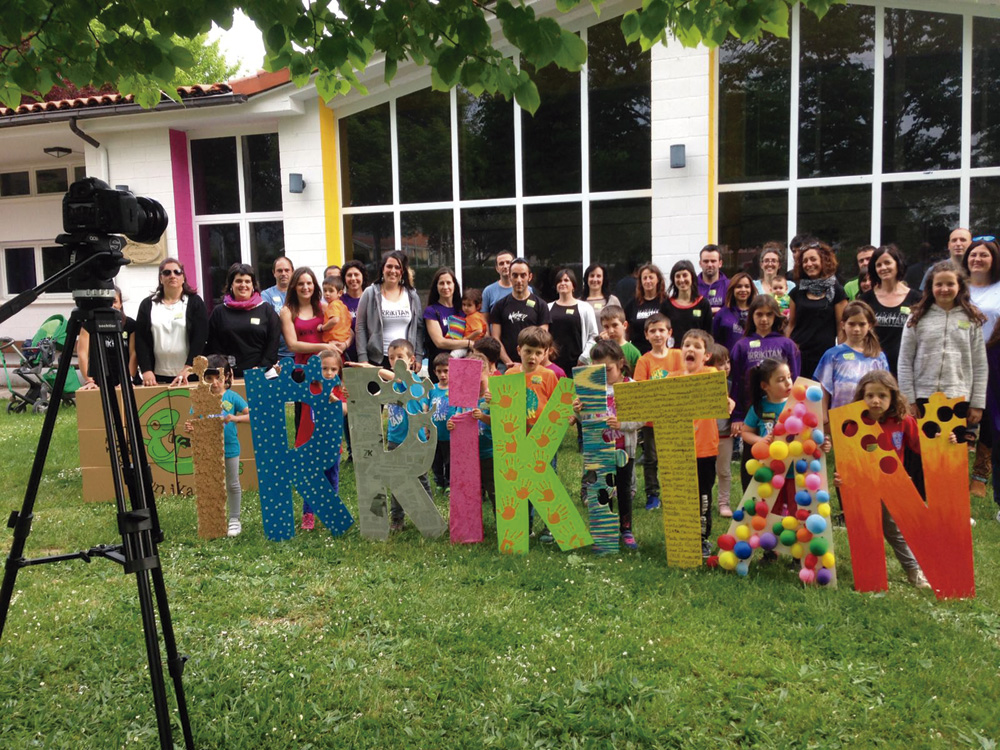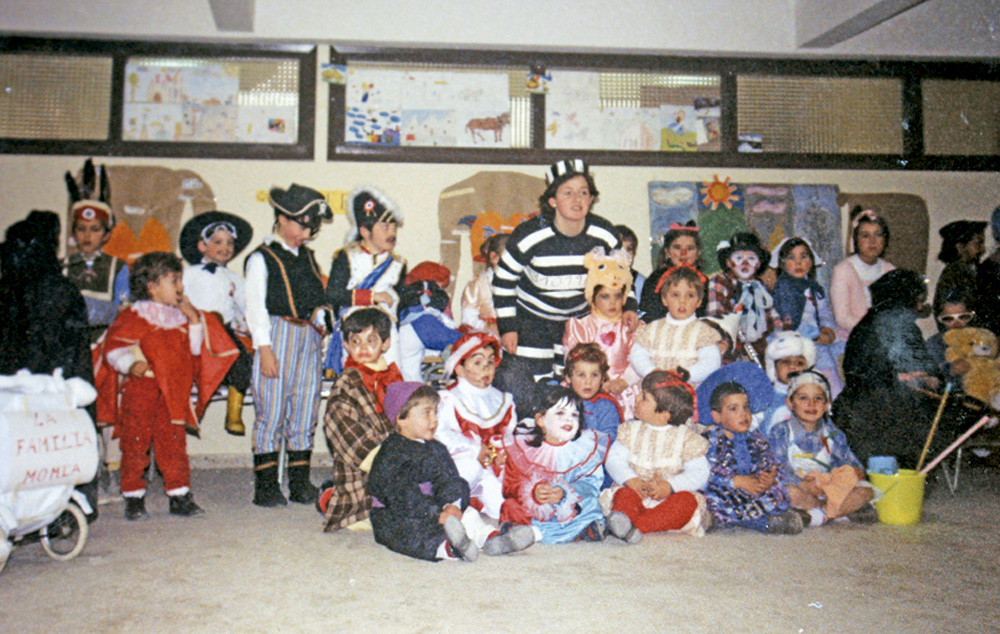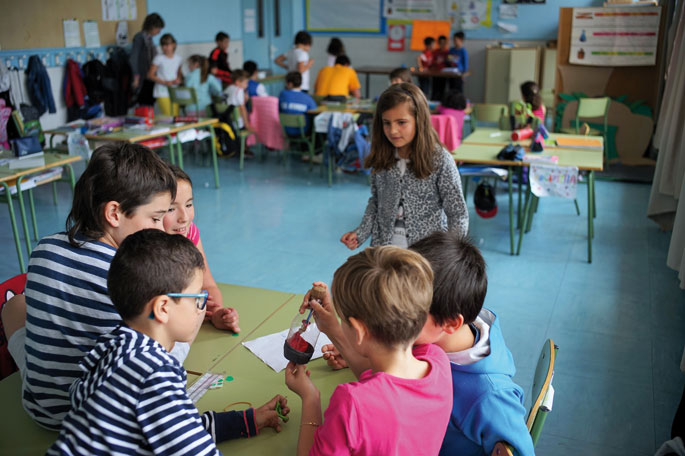Leire Sueskun (Vitoria-Gasteiz, 1981), a technician at the Basque Service of the Cuadrilla, believes that the recovery of the Basque language in Rioja Alavesa requires "the work of all". With Araba Euskaraz, for example, this Sunday they will give you the strength to continue with the project of the ikastolas, but with eleven projects on the table to influence other sections.
At a glance, what is the status of Basque in Rioja Alavesa?
According to 2011 Eustat data, in Rioja Alavesa 43.43% are Basque and quasi-Basque. The average was 56.57%. Of course, these numbers could be improved; in any case, going back a few years, in 2006, they were 38.99% and 61.01%. We have experienced an increase in our region in recent years, although it is not as pronounced as it has been in the period 1981-2011, when it was 2.54% and 97.46%, respectively. Looking at these numbers I would say that society gives the necessary importance to bilingualism; bilingualism, multilingualism enriches us and people see that. Today, in terms of knowledge, all peoples are similar in similar numbers, with exceptions. It is true that in recent years the number of quasi-Basques has grown more than the number of Basques. This is directly reflected in the sociolinguistic survey, which shows that use has not increased as much as knowledge. Bastida was in first place in 2006 and 2011 in relation to these figures: in these two years it has had the highest percentages of Basques and quasi-Basques.
As an English technician, what is your biggest challenge?
Strengthening its use in groups where knowledge is particularly high, especially in those over 40 years of age, but without forgetting knowledge and motivation. They are concepts that feed each other, so the three are always to be considered.
It's a Spanish committee, isn't it?
Yeah, that's right. We have an Advisory Council in our region. This is where we bring together agents from different fields, including schools, euskalegia, administrations, sports recreation and the media. The Commission meets twice a year: to define the lines of the year at the beginning of the year and to make an assessment of what has been done at the end of the year. When we develop the guidelines drawn up by the Commission, we always put the signature or brand "Basque Language and Basque Service in Rioja Alavesa", in short, the projects that people see are influenced by everyone, with the help of everyone, thanks to the work of everyone: schools, euskalegia, associations, administration, etc. What we want to express with this firm or group is that in our region we are many agents with the same objective: Basque. We also have a website, the Basque portal of Rioja Alavesa: www.euskaramaitedut.eus. This is where we publish, or try to report, everything that is done in or about Basque in our region.
What is your relationship with the city council?
In general, good. There are some exceptions, but in general I work with everyone. It is difficult to deal with all the tasks correctly. The most important work I have with the municipalities is the elaboration and development of the management plan that corresponds to each entity. This is our plan to have the presence that the Basque language should have in each entity. In any case, there are some municipalities, sometimes on their own initiative, that want to deepen in this sense and for this they come to ask us for help or advice from the Basque Service. It would be interesting for these entities to always consider the Basque criteria so that the Basque language does not only have a presence in forms, linguistic landscapes and the like. If I want to go further, it seems to me to be a strategic and effective way, for example, to establish and comply with language barriers in hiring. Especially in certain services: pool lifeguards, in the allocation of municipal pool facilities and/or in the allocations for the development of the sports offer. Imagine how influential we would be if we established language criteria: we would guarantee the presence of the Basque language in the administration itself and in the sphere of influence of the administration.
With the other cultural associations and groups?
My relationship with them is very positive. I work mainly with the IKA Rioja Basque Language School, which operates throughout the region, and the Ttiki-ttaka Basque Association in Rioja Alavesa – in addition to the individuals, the Basque Language School and four regional schools – Assa Ikastola, Bastida Ikastola, San Bizente Ikastola and Lantziego Ikastola. I have direct and constant contact with them, since they have the same sphere of influence as the Basque Service, that is, the region. Without their support, it would be very difficult to carry out the work that needs to be done, namely the development of ESEP.
Is there sufficient investment in the Basque language? What is needed?
If we had more economic and human resources in more areas, we could influence them in a different way. It is always good for us to have a bigger budget in the Basque Service, but we would also need more people, because the work is a lot and to deal with it correctly would be necessary to have at least one other person. It is currently impossible to obtain these resources, so we will move forward with what we have. To the extent that we can influence it. Better times will come.
What are the students’ contributions to the Basque language?
Direct and not exclusive to the academic field, which goes beyond. In general, Basques in our region comes from this path, that is, from transmission through education. In addition, and thanks to the language projects of the schools, they try not to stop the work done by them in the academic field. They’re always looking to the city. A direct example of this is, in our case, the work carried out through the Ttiki-ttaka association. They lead some strategic projects in the region, such as the Basque Cultural Weekend – to weave a network between children and young people in our region, among other objectives – and the Basque Observatorio Course – which educates in Rioja Alavesa and in Basque the monitors that will influence their future leisure time.
How much does Euskara have in the area of wineries, in the strategic section of the territory?
Our job is to take steps to increase the presence of the Basque language in this area and in more daily services such as bars, restaurants, butchers, shops and similar. For example, if you’re looking at Rioja Alavesa, Yes! We are preparing the campaign with the aim of influencing the socio-economic sphere.
What has Araba Euskaraz brought to the region?
It always has an economic objective to face the project that each center wants to launch, but with this party we also come to the region with a different strength: it gives strength to continue with the project of the centers. The Basque language has its place in Rioja Alavesa and the recovery of the whole place that belongs to it requires the work and strength of all.
This news has been published by Alava Alea and we have brought it to LUZ thanks to the license CC-by-sa.





















